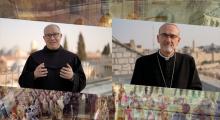Issued by the Catholic Center for Studies and Media - Jordan. Editor-in-chief Fr. Rif'at Bader - موقع أبونا abouna.org

Following is the meditation of Latin Patriarch of Jerusalem His Beatitude Patriarch Pierbattista Pizzaballa for first Sunday of Advent, Year B, November 29, 2020:
Today, we begin a new liturgical year, accompanied by the reading from the Gospel of Mark. And we start it with this passage (Mk 13:33-37) in which the invitation to watch, to pay attention, echoes several times. To enable us to enter this experience, Jesus recounts a short parable that speaks of a man who leaves on a journey and leaves his house to the servants, entrusting each one his proper task. He orders the gatekeeper to be on watch, and then it’s extended to everyone. We must watch so that on his return, of which no one knows the time, the master does not find sleeping servants.
Also, the parallels of Matthew (25:13) and Luke (12:36), while using other terms with the expression “watching,” indicate above all staying awake, always ready and alert. They invite us to prepare because we do not know when the master will return. As if to say that we do not know the times and do not control time, but we must live it with a careful and vigilant gaze.
The first consideration, then, is that keeping vigil does not mean to do something, there are no specific actions, but it is a way of being in life, an attitude of the heart. It knows how to value the time given to us, to be in life know that we are awaiting someone, it is to live knowing that from this life the Lord, that we are on the way towards a goal which is the encounter with Him.
Time, this time, is the place in which to discover the signs of God’s presence. Vigilance, therefore, is the art of discerning the signs of the times. The believer must know how to scrutinize the signs of the times; he must pay attention to human reality, its facts, and events of the times in which he lives. It is an expression that we find in the Gospel of Matthew (16:4), there where Jesus asks: “Can’t you distinguish the signs of the times?”
Discerning the signs of the times means trying to understand where human history, in some way, meets with the plan of God.
Falling asleep, on the contrary, will be nothing other than losing this awareness, living as if we were not expecting anyone, as if history were only a series of events that end in themselves. When that happens, the horizon closes on the here and now. What we do becomes everything, becomes our entire life.
So, it is no coincidence that the year begins precisely with Advent and with that gaze on the future. It is essential to start from here, immediately clarifying where we are going, where the Lord is leading us, and where He awaits us.
Only with this gaze focused on the goal, the journey has meaning, and it is possible to be in life in a new way. One can look at the world’s things, not as an absolute, which fulfills all the man’s aspirations, but not even, on the contrary, as something of an accessory that does not have any value.
Jesus, in the Gospel, avoids both positions. He affirms with confidence that time is waiting for an encounter, but He also says that this encounter can happen if life is lived in vigilance and in waiting.
Jesus invites us, in short, to be in the world in a new way because it is true that fulfillment lies in the end, but it is equally valid that we already taste what we believe in and towards which we walk.
Indeed, the Kingdom must still come, yet that Kingdom that we are awaiting is already among us. This land, this history in which we live, is an anticipation of the future Kingdom, and so everything takes on a new meaning. We live in a life with a full and shared taste because the present moment is already participation, the anticipation of the future life. The current time becomes the place of encounter with God, and this awareness pushes us to do good for ourselves, to become diligent and attentive workers, to awaken servants who know how to invest talents received. Do not turn in on oneself but be alert to the life of the world, with the awareness that death and fear cannot extinguish the power of love that we are given.
It is not merely to enter this perspective; this gaze requires an authentic path of conversion. And this will be the theme of the following Sunday.
A final observation on the expression, “leaving his home, he placed his servants in charge, each with his task” (13:34). We said that history is of God. The universe belongs to Him, as well as the mission in the world. The fact of not feeling like owners of this world and this time also makes us understand that our life does not depend on the immediate realization and satisfaction of our undertakings, as if everything depends on today. We are complete, however, when, in God’s unfathomable plans for this world, we freely find our right place (“to each one his task”) and understand that we belong to one another. Each person’s vocation is part of the most extraordinary mission of God, to which everyone, each one according to his task, contributes.
This way of being in history makes the Christian a witness. A witness to what we are walking towards and what we believe. A witness of a new way of being in history, for which this earthly life, although important, is not everything. One can even lose it, as long as one does not lose the encounter with the Lord.
We begin Advent with this same gaze.
+Pierbattista







